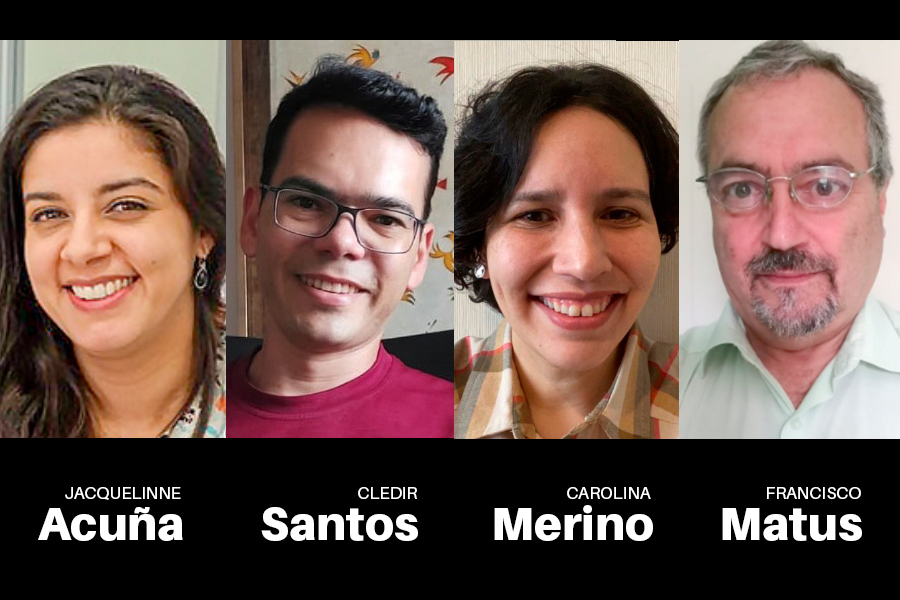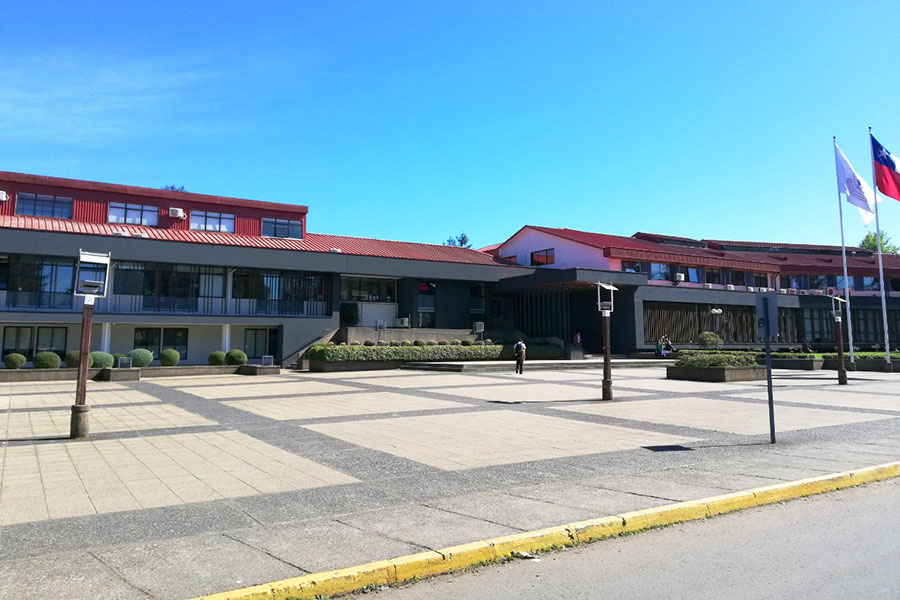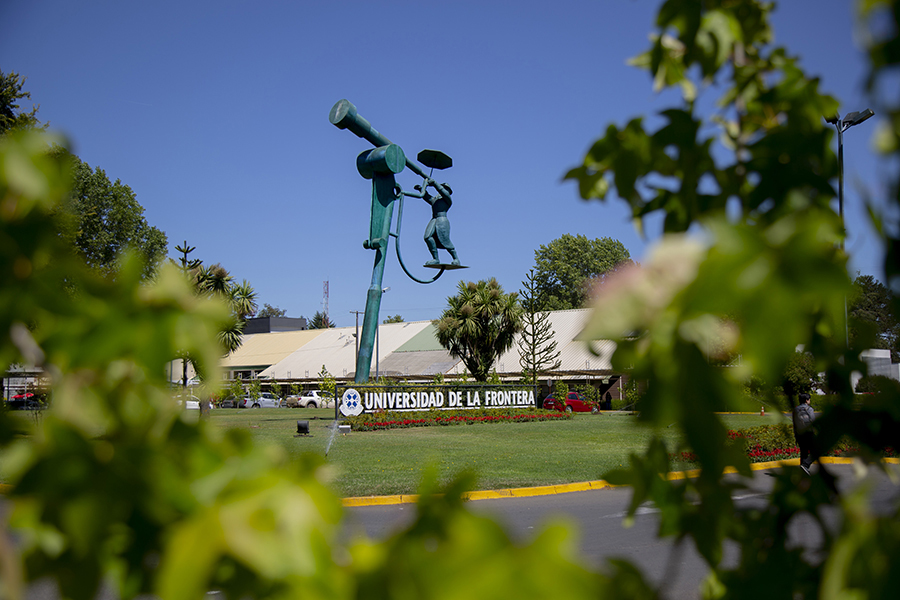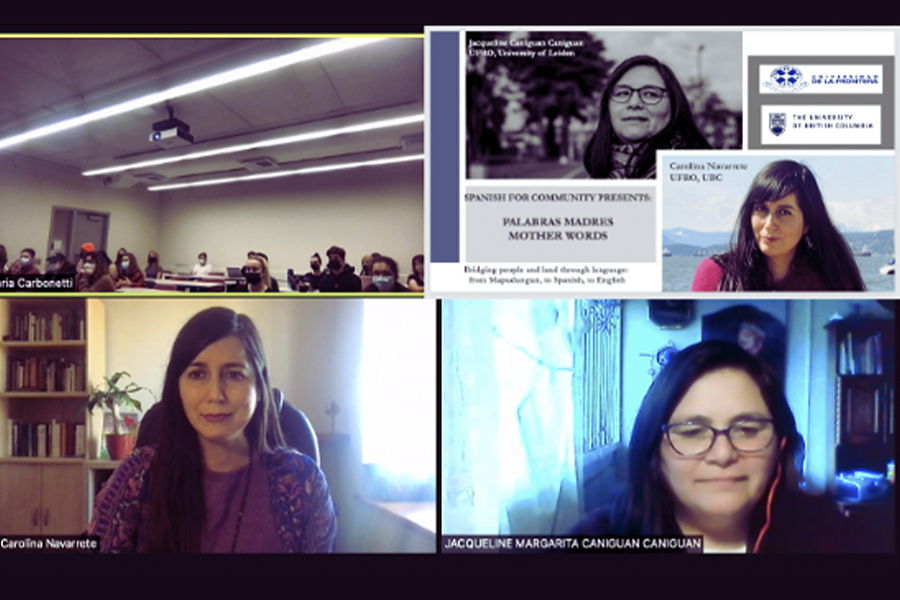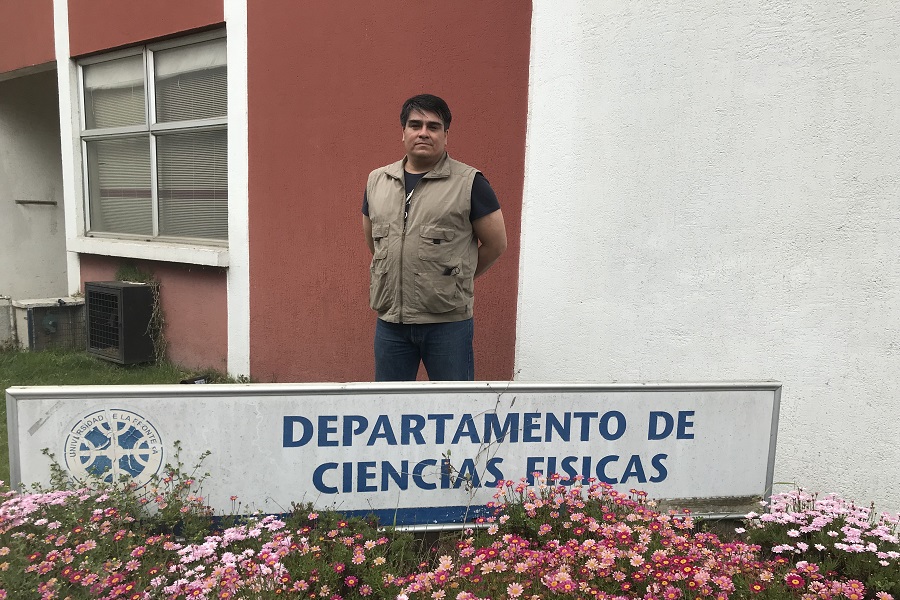Academic staff of Doctorate in Natural Resource Sciences got four Regular FONDECYT Projects approved
|
The projects of Jacquelinne Acuña, Carolina Merino, Cledir Santos and Francisco Matus, who are part of the agronomy group, will each have a duration of four years. |
Four academic staff members of the Doctorate in Natural Resource Sciences of the Universidad de La Frontera (UFRO) got the funding for their project proposals in the Regular FONDECYT (“Chilean National Fund for Scientific and Technological Development”) Project competition call 2022 approved. This is another step towards the strengthening of the research of the Doctoral Program. With its competition calls and by funding individual research projects of excellence, the Chilean National Agency for Research and Development (ANID) seeks to promote scientific and technological research in various fields of knowledge, and this year, UFRO got 14 new Regular FONDECYT Projects approved in the competitive call 2022. The development of these projects will strengthen the fields of research of the Doctorate in Natural Resource Sciences and directly benefit the human capital trained in this program. “The current results of the FONDECYT competitions show the impact and importance of our doctoral programs, with four approved Post-Doctoral Projects, one Initiation in Research and two Regular FONDECYT Projects of our program´s graduates who have been strengthening the research of our program and our university with their work,” Dr. Quiroz added. DEVELOPMENT OF A BIOFUNGICIDE Dr. Cledir Santos, a researcher of the Faculty of Engineering and Science, is the researcher in charge of the project “Development of a biofungicide from pod extracts of Capsicum annuum L. to prevent mycotoxigenic fungi in wheat production”. This project seeks to develop a biofungicide from pod extracts of Capsicum annuum L. (hot pepper), irradiated with gamma rays to prevent the development of mycotoxigenic fungi in wheat produced under greenhouse and field conditions in the La Araucanía Region in Chile. This project is based on One Health, an approach where a healthy agricultural production environment, free of synthetic pesticides, will lead to a healthy society, with a better quality of life. The researcher will receive an amount of 246.028.000 CLP (ca. 305 thousand USD) to carry out his project in cooperation with his national co-investigators of UFRO: Dr. Rodolfo Figueroa, Dr. Pablo Cornejo, Dr. Marjorie Reyes, and Dr. Antonieta Ruíz; the external national co-investigators: Dr. Patricio Sandaña (Universidad Austral), Dr. Patricio Sandaña (Universidad Austral), Dr. Marjorie Reyes, and Dr. Antonieta Ruíz (Universidad Austral), who are part of the academic staff of the Doctorate in Natural Resource Sciences; the external national co-investigator: Dr. Patricio Sandaña (Universidad Austral de Chile); and the foreign co-investigators: Dr. Paola Battilani (Faculty of Agricultural, Food and Environmental Sciences, Università Cattolica del Sacro Cuore, Italy), Dr. Nelson Lima (Centro de Engenharia Biológica, Universidade do Minho, Portugal), and Dr. Naresh Magan (Cranfield University, Soil and Agrifood Institute, Great Britain). INOCULANT TO IMPROVE TOLERANCE TO WATER SCARCITY IN LUPINE PLANTS Dr. Jacquelinne Acuña, a graduate of the Doctoral Program who is currently working at the Scientific and Technological Bioresource Nucleus (BIOREN-UFRO) is the researcher in charge of the project “Development of intelligent cooperative microbial consortia based on in situ culture and its functional complementarity to improve stress tolerance in lupine plants”. This study will develop in situ cultures in combination with functional methods and metabolic and genomic trials to explore intelligent cooperative microbial consortia (iCMC) and evaluate their ability to improve the water stress tolerance in lupine plants. First, novel in situ cultivation techniques will be used to isolate naturally co-existing microbial consortia. Then, iCMCs will be selected and observed under greenhouse and field conditions, applying them as inoculants to improve the tolerance to water scarcity. It is expected to gain insights into the interactions that occur in response to stress, allowing to improve the resilience of agricultural production in response to droughts. The researcher will receive an amount of 223.200.000 CLP (ca. 276 thousand USD) to carry out her project in cooperation with her co-investigators Dr. Shoko Ueki (Okayama University, Japan); Dr. Lukas Wick (Helmholtz Centre for Environmental Research, Germany); Dr. Qiang Zhang (University of Minnesota, USA) and Dr. Haroldo Salvo (Agriaquaculture Nutritional Genomic Center, Chile). THE NITROGEN CYCLE AND ITS TRANSFORMATION STEPS IN TEMPERATE RAINFOREST SOILS Dr. Francisco Matus, an academic of the Faculty of Engineering and Science, will receive an amount of 220.000.000 CLP (ca. 274 thousand USD) to carry out his project “Ferrous wheel coupled to nitrate reduction as a mechanism for nitrogen retention in temperate rainforest soils”, in cooperation with his co-investigators: Dr. Carolina Merino (UFRO), Dr. Ignacio Jofré (UFRO), Dr. Felipe Aburto (UDEC/Texas University) and Dr. Roberto Godoy (Universidad Austral, Chile). This study seeks to understand the nitrogen cycle and its transformation in temperate rainforest soils (forest of Valdivia, Chile), since the nitrogen availability is usually low and greenhouse gas losses are high in these soils. This can partly be explained by the biological reduction of nitrate to ammonium under anaerobic conditions and by the Ferrous Wheel (FW) hypothesis, which has recently been tested in an experiment with soils from the forests of Valdivia. The FW indicates that soluble iron, which appears to be high in these soils, is able to act on the N-mineral by fixing it as organic nitrogen and preventing this nitrogen from accumulating in the soil and being released into water currents and lost as greenhouse gases. The FW hypothesis will be assessed under field conditions, in soils derived from different parent materials, with different iron and nitrogen levels. 15N stable isotopes will be applied as natural tracers, in order to determine at what rate and how much nitrogen is accumulated in the different organic nitrogen reserves in the soil. The researchers expect to find high levels of nitrogen fixation in organic compounds. This could contribute in the process of carbon sequestration, with important implications for this kind of ecosystems and climate change mitigation. COMPLEMENTARY MECHANISMS OF SOIL ORGANIC MATTER (SOM) OXIDATION AND GREENHOUSE GAS (GHG) EMISSIONS Dr. Carolina Merino, a graduate of the Doctoral program who is currently working at the Scientific and Technological Bioresource Nucleus (BIOREN-UFRO), got her project “Biotic and abiotic oxidation mechanisms of organic matter in humid temperate forest soils in fluctuating redox microsites” approved. She will receive an amount of 220.000.000 CLP (ca. 274 thousand USD) to carry out her project in cooperation with Dr. Francisco Matus (UFRO), Dr. Ignacio Jofré (UFRO), Dr. Felipe Aburto (UDEC/Texas University) and Dr. José Dorner (Universidad Austral, Chile). The main purpose of this project is to study the complementary mechanisms of soil organic matter (SOM) oxidation and greenhouse gas (GHG) emissions in soil microsites, through abiotic (e.g. Fenton reaction) and biotic (e.g. mineral oxidizing/reducing microorganisms) interactions in humid temperate forests in southern Chile (mean annual precipitation of 1,700 - 8,000 mm). These mechanisms could explain the high rate of soil organic carbon (COS) mineralization, challenging the traditional approach, according to which the mineralization under the anoxic condition of these soils is significantly low. Thus, the Doctorate in Natural Resource Sciences got a high number of projects approved in the competitive FONDECYT calls 2022, with four Post-Doctoral Projects of the program’s graduates Cecilia Paredes, Claudia Sanhueza, Isis Vega and Karla Araya, one Initiation in Research Project (Paola Fincheria) and three Regular Projects (Jacquelinne Acuña, Carolina Merino and Sebastián Meier). In addition to that, one Initiation in Research Project (Javier Espinoza) and two Regular FONDECYT Projects (Cledir Santos and Francisco Matus) of academic staff members of the Doctorate were approved.
Written by: Doctorate in Natural Resource Sciences, UFRO |
|
The Universidad de La Frontera starts this year with 36 new FONDECYT (“Chilean National Fund for Scientific and Technological Development”) Projects (14 Regular, 10 Initiation in Research, and 12 Post-Doctoral Projects). |
“This result confirms the great performance of our researchers in a system of increasingly competitive public competitions,” commented the Vice-Rector for Research and Graduate Studies of the Universidad de La Frontera (UFRO), Dr. Rodrigo Navia Diez, after receiving the good news. “2021 is over and we start this new year with 36 awarded FONDECYT Projects and the commitment to keep encouraging our researchers in order to move forward and to align our work with the current needs and global issues,” he added. The proposal selection process is very strict and includes an analysis of the quality, feasibility and degree of scientific and technological innovation of the project, as well as of the previous productivity of the researcher in charge of the project. The Chilean National Agency for Research and Development (ANID) seeks to promote scientific and technological research in various fields of knowledge with its competitions, and by funding individual research projects of excellence, in order to create knowledge. According to Dr. Carolina Navarrete, the Research Director at UFRO, this important achievement reflects the progress and leadership of the research of excellence produced at UFRO in the fields of science and technology. The awarded projects cover the fields Exact and Natural Sciences (especially mathematics, chemistry and theoretical and experimental physics); Technology and Engineering Sciences (especially engineering); Social Science (especially early childhood education, sociology and psychology); and Humanities (especially linguistics and transdisciplinary and interdisciplinary research). “There is no doubt that these results are the product of a cooperative effort between the Vice-Rectorate for Research and Graduate Studies and the Research Office, which support the academics and researchers of UFRO who conduct cutting-edge research. In this regard, the incentive strategies and permanent support are showing results. But we are also aware that we have to strengthen the work of our researchers even more and that is why we are working hard to promote the research of UFRO through the introduction of new thematic competitions together with other universities in Chile as well as in the rest of the world. We are working on the process of reviewing our policies, because it is important to make progress in research based on the most up-to-date knowledge, having the transformations of our society in mind. It is essential to constantly improve the institutional support strategies for our researchers and we are strongly committed to that, since it is one of our challenges in 2022 and the future,” she added. These are the researchers who will receive funding for their Regular FONDECYT Projects by ANID: Jacqueline Acuña Sobarzo: “Development of intelligent cooperative microbial consortia based on in situ cultivation and their functional complementarity to improve lupine stress tolerance”. Mónica Bravo Sanzana: “Evaluación de una medida multidimensional y multi-informante de Clima Social Escolar y bienestar hedónico y eudaimónico para estudiantes adolescentes en etapa de transición educativa” (Evaluation of a multidimensional and multi-informant measure of Social School Climate and hedonic and eudaimonic well-being for adolescent students in an educational transition stage). Carlos del Valle Rojas: “El proyecto civilizatorio en la industria cultural de América Latina. Fundamentos ideológicos, encuadres mediáticos y estrategias de enemización durante los siglos XIX, XX y XXI. Los casos de Chile, Argentina, Perú y Colombia” (The civilising project in the Latin American culture industry. Ideological foundations, media frames and enemisation strategies during the 19th, 20th and 21st centuries. The cases of Chile, Argentina, Peru and Colombia). Francisco Matus Baeza: “Ferrous wheel coupled to nitrate reduction as a mechanism for nitrogen retention in temperate rainforest soils”. Carolina Merino Guzmán: “Biotic and abiotic oxidation mechanisms of organic matter in humid temperate forest soils in fluctuating redox microsites”. Carlos Muñoz Poblete: “Towards reliable movement identification for dairy cattle based on self-calibration attitude estimate algorithms”. Aldo Olate Vinet: “Fenómenos de cambio de valencia y orden sintáctico en el castellano hablado por bilingüés mapuche/español. Un abordaje desde el contacto lingüístico y la tipología sintáctica” (Valency change and syntactic order phenomena in Spanish spoken by Mapuche/Spanish bilinguals. An approach based on language contact and syntactic typology). Cristián Paz Robles: “Hemisynthesis of Drimane Sesquiterpenoids isolated from Drimys Winteri as modulators of hα7 and hα4β2 nAChR subtypes: searching for specific ligands with neuroprotective activity” Sebastián Reyes Carocca: “Group actions on Riemann surfaces and abelian varieties”. Mauricio Santibáñez Villalobos: “Dosimetry characterization and optimization of the dose enhancement and dose sparing process produced with Gd-nanoparticles infused in tumor by treatments with electronic brachytherapy and Radiotherapy Flattening Filter Free”. Cledir Santos: “Development of a biofungicide from pod extracts of Capsicum Annuum L. to prevent mycotoxigenic fungi in wheat production”. Ítalo Trizano Hermosilla: “Fiabilidad de la medida para datos categóricos con estructuras latentes bifactor: Comparando el nivel de sesgo de diferentes estimadores obtenidos desde la teoría clásica de los test, sus extensiones factoriales y la Teoría de Respuesta a los Ítems” (Measurement reliability for categorical data with bifactor latent structures: Comparing the level of bias of different estimators obtained from classical test theory, its factorial extensions and Item Response Theory). Héctor Young Conejeros: “Model-free predictive control of ac microgrids”.
Written by: Andrea Poblete Pacheco
|
|
UFRO climbs to the sixth position in the overall ranking and is among the top 10 in Chile regarding its programs in Psychology, Nursing, Nutrition and Dietetics, Dentistry, Agronomy, Journalism and Sociology. |
The Universidad de La Frontera (UFRO) climbed three positions in the América Economía Ranking 2021 compared to last year, being in sixth place among the universities in Chile and in third place regarding the state universities in Chile. The ranking assesses Chilean universities that voluntarily provide detailed information about the quality indicators in different dimensions, such as Teaching Quality, Research, Accreditation, Infrastructure and Financial Efficiency, Inclusion and Diversity, University Life, Outreach and Community Engagement, Student Quality and Internationalization. The indicators where UFRO stands out are Accreditation, with the best evaluation (93.1), Student Quality (87.23), Inclusion and Diversity (81.96), and Research (81.85). The Vice-rector for Academic Affairs, Dr. Renato Hunter Alarcón, highly appreciates the sixth position of UFRO, which is an improvement compared to last year’s version of the ranking, as well as the position of seven of UFROs programs, which are ranked among the top ten in the Ranking according to Program, respectively. “This is an important result for our university, since it puts us in a place of excellence among the universities of the Council of Rectors of Chilean Universities (CRUCH) and the Consortium of Chilean State Universities (CUECH). Our current leading position is the result of the great collaborative work of our entire university community, as well as the focus on an efficient management. At the same time, it is always important to have some external entity assessing our indicators, because it gives us the chance to see ourselves from another point of view within the national scenario,” he said. “And besides, this great result does not only represent our university in total, but also some of our undergraduate programs entered the Rankings according to Program, what makes us very proud,” he added. RANKINGS ACCORDING TO PROGRAM The Ranking also assesses 16 different undergraduate programs and ranks the best universities to study these programs. In this context, the Universidad de La Frontera is in the top ten regarding seven of its undergraduate programs. Regarding the program in Psychology, UFRO is ranked in fourth place; in sixth place regarding the programs in Nursing, Nutrition and Dietetics, and Dentistry; in seventh place regarding the program in Agronomy; and in eighth place regarding the programs in Journalism and Sociology. CLICK HERE TO SEE THE AMÉRICA ECONOMÍA RANKING 2021 Written by: Communications Office, UFRO |
|
The project was created in cooperation between the two universities and seeks to advance in the field of interculturality and to work on two global goals of the Sustainable Development Goals, such as Climate Action and Quality Education. |
In search for relevant advances in the field of interculturality, Dr. Carolina Navarrete, a researcher in the field of Literature of the Faculty of Education, Social Science and Humanities at the Universidad de La Frontera (UFRO), Chile, and Dr. María Carbonetti, a researcher in the field of Hispanic Studies at the University of British Columbia (UBC), Canada, and coordinator of the initiative “Spanish for Community” at UBC, started to work together on the creation of a project called “Mother Words and the rights of the planet: literary and linguistic vitality for the repair of the earth”. One of the aims of this project is to advance in the field of interculturality and to work on two global goals of the Sustainable Development Goals (SDG): Climate Action and Quality Education. Dr. Carbonetti at UBC in Vancouver, Canada, pointed out: “I decided to work with UFRO because both of our universities are interested in ancestral tradition and culture – of the Chilean Mapuche People at UFRO and of the Canadian Musqueam People at UBC.” In this respect, she added that “being fully aware of the implications of teaching and learning through indigenous languages, this is a first approach, and our project will allow us to create study materials for our universities, as well as for our communities. We want to promote a profound reflection on the transnational reality of indigenous territories and their epistemologies and to decolonize the teaching and learning experience”. Through the study and translation of literary texts – Mapuche poetry in particular – Dr. Navarrete highlights the aspect of literature produced within the territory to generate nourishing dialogues between cultures. She explains that “the potential of literature to cross borders is impressive, since we can promote a cultural transformation through its study. That positively affects the teaching and learning process, for the students as well as for the teachers at UFRO and UBC. But it also helps us to connect with our environment and our indigenous communities in the La Araucanía Region in Chile and in British Columbia in Canada, based on currently relevant topics such as interculturality, respectful dialogues and the protection of our planet,” explained Dr. Carolina Navarrete. In October, the first approach for this new project was made upon invitation of Dr. Carbonetti and the researchers Dr. Carolina Navarrete and Jacqueline Caniguan, who lectured about the importance of culture and the language and literature of the Mapuche People, interacting with students of the “Spanish 301-102” course of UBC. This project, which is going to be carried out during 2022, will be translated into four different languages: Mapuzungun, Musqueam, Spanish and English; and the main researchers in charge are Dr. Carbonetti of UBC and Dr. Navarrete of UFRO. This joint work between both universities will also allow to strengthen the links and to improve the knowledge about cultural aspects of ancestral epistemologies and to make progress in terms of interculturality, “to stop thinking in an extractivist way and to understand different approaches, understandings and narrations of reality,” Dr. Navarrete affirms. Written by: UFRO Communications Office |
|
Two papers of Dr. Pablo Riquelme, an academic of the Department of Physical Sciences of the Universidad de La Frontera (UFRO) were cited in Scientific Background on the Nobel Prize in Physics 2021, where the arguments are given that allowed Dr. Giorgio Parisi of the Sapienza University of Rome (Italy) to be distinguished with the Nobel Prize in Physics 2021. |
The winners of this year´s Nobel Prize in Physics were announced at the beginning of October and one of them is Dr. Giorgio Parisi of the Sapienza University of Rome in Italy, for his groundbreaking contributions to our understanding of complex systems, with the discovery of the interaction of disorder and fluctuations in physical systems from the atomic to the planetary scale. Each year, when this honor is granted, a text with the scientific background that justifies the awarding of the Nobel Prize is released. This year, two works developed by Dr. Pablo Riquelme, an academic of the Department of Physical Sciences of the Universidad de La Frontera (UFRO) were cited in that text. Dr. Riquelme explained that “around 1980, Giorgio Parisi discovered hidden patterns in disordered complex materials, obtaining a mathematical method called Replica Symmetry Breaking (RSB) to solve the problem. This theory has been studied and applied by researchers in the fields of magnetism, statistical physics and others for about 40 years, and the successful demonstration of the validity and success of this theory was accomplished indirectly by several authors since the presentation of this theory”. The first direct evidence supporting RSB was shown in “Experimental evidence of replica symmetry breaking in random lasers”, published by N. Ghofraniha et al., Nature Commun, in January of 2015. “This group from Italy was able to demonstrate the analogy between Spin Glasses and Random Lasers (in a 2D system – organic layer) for the first time, and to directly measure the behavior of the probability distribution of the replications, analyzing the intensity fluctuations of the random laser,” explained Dr. Riquelme. “Together with the group from Brazil, which I work with, we published a verification of the RSB theory in a random laser (3D system – nanopowders with crystalline particles doped with neodymium ions): ‘Observation of Lévy distribution and replica symmetry breaking in random lasers from a single set of measurements, Scientific Reports’ in June 2016, which was cited in Scientific Background on the Nobel Prize in Physics 2021 as part of the experimental demonstrations of the work of Giorgo Parisi,” he added. Furthermore, a second paper developed by the research group in which Dr. Pablo Riquelme participates was cited as another example of the application of the theory of Dr. Parisi, a study about the relationship between the complex systems of turbulence hierarchy in a random fibre laser, which was published in Nature Communications. “This makes me very proud and motivates me to keep working on the ideas which I try to explore at the Universidad de La Frontera. I am currently working with my friends and colleagues from Brazil, who want to get to know and work with our university. Our work on papers inspired by the ideas of Dr. Parisi does not end with getting the Nobel Prize, on the contrary: this is the beginning for new research in different fields, such as biology, neuroscience, climate, machine learning, artificial intelligence, and so on,” said Dr. Pablo Riquelme. The Faculty of Engineering and Sciences also highlighted this citation. “It is a great source of pride for our Faculty that our researcher´s work is cited in the research of Dr. Giorgio Parisi, who won the Nobel Prize in Physics in 2021. There is no doubt that this citation shows the relevance and impact of the research that is being developed at UFRO. It is an important encouragement to support and strengthen the work of our researchers,” said Dr. Jorge Farías Avendaño, the Dean of the Faculty.
Written by: Daphne Bormann Parada
|





